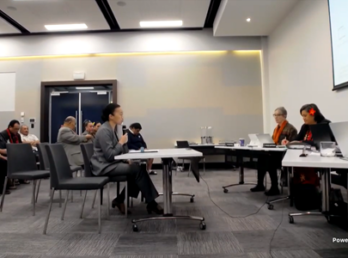The Family Court (Supporting Children in Court) Legislation Bill: An overview articles
Date
1 Dec 2021
Related Expertise
This article was first published in Vol 23 Issue 1 of Family Advocate. The Family Advocate have kindly granted permission for this article to be republished.
The Family Court (Supporting Children in Court) Legislation Bill (“the SCC bill”) is being referred to as an omnibus bill, as it would result in amendments to both the Care of Children Act 2004 and the Family Dispute Resolution Act 2013.
In short, the SCC bill seeks to enhance the wellbeing of children in proceedings concerning their care or contact.
The key objectives of the SCC bill are to:
- Reinforce the existing expectation that a child should have reasonable opportunities to participate in decisions affecting their care and welfare and, in doing so, give better effect to a child’s fundamental rights under the United Nations Convention on the Rights of the Child.
- Set new expectations to ensure that lawyers appointed to represent children in proceedings are suitably qualified to represent that child, and that they adequately explain such proceedings to their clients.
- Require lawyers to facilitate the efficient resolution of disputes by promoting conciliation in order to minimise harm to children, families and whanau.
- Reinforce the need for the Court to recognise and respond appropriately to family violence; particularly the impact it has on children and their care arrangements.
How does the bill aim to achieve its objectives?
The SCC bill aims to achieve the above mentioned objectives by providing better support for children both directly and indirectly. More specifically, it proposes to support children directly by:
- Ensuring emphasis is given to a child’s voice being heard both in Court processes and in Family Dispute Resolution (FDR).
- Clarifying how the Court should consider risks to children of family violence.
- Stipulating the required characteristics of a lawyer appointed to represent a child.
It proposes to support children indirectly by assisting parents to take steps to resolve parenting disputes in an efficient manner, without the need for court intervention, by compelling lawyers to promote conciliation – which is effectively a reinstatement of the duty formerly imposed on lawyers under the Family Proceedings Act 1980, repealed in 2014 (though that section, section 8, also included reconciliation).
The idea is that this will relieve some of the unrelenting pressure on the backlogged family courts by reducing the number of cases which enter its doors, and thus lead to proceedings being progressed and determined more swiftly (noting the current statistic that it takes care of children proceedings 300 days on average to be resolved).
The proposed changes (as they currently stand) to the existing legislation can be distilled into the following tabulated form:
| Existing statute/section | Proposed change under SCC bill: (Note: Where there have been amendments recommended, the initial wording has been included but ruled out) |
| Care of Children Act 2004 | |
| Section 5 (Principles relating to child’s welfare and best interests) | Section 4: After section 5(f), insert: (g) a child (b) the principles set out in section 4 of that Act guiding the achievement of that purpose. |
| Section 5A (Family violence to be taken into account) | Section 5: After section 5A(1), insert: (1A) In taking into account the principle in section 5(a), the court must have regard to— (a) the purpose of the Family Violence Act 2018, under which an order specified in subsection (1)(b) was made; and (b) the principles set out in section 4 of that Act guiding the achievement of that purpose. |
| Section 6 (Child’s views) | Section 6: Before section 6(1), insert: (1AAA) The purpose of this section is to implement in New Zealand Article 12 of the United Nations Convention on the Rights of the Child. |
| Section 7 (Appointment of lawyer to represent child in proceedings) | Section 7: In section 7, insert as subsection 2: (2) When appointing a lawyer to represent a child, the court or Registrar must, so far as is reasonably practicable, appoint a lawyer who is, by reason of their personality, cultural background, training and experience, suitably qualified to represent the child. |
| New section 7AA (Lawyer appointed to represent child must explain proceedings to child) | Section 8: After section 7, insert: (7AA) A lawyer appointed under section 7 to represent a child must, if it is reasonably practicable to do so having regard to the age and maturity of the child, explain the nature of the proceedings to the child in a manner that the child is most likely to understand. |
| Section 7B (Duties of lawyer when giving advice) | Section 9: Replace the heading to section 7B with “Duties of lawyers.” In section 7B, insert as subsection (2): (2) Before commencing a proceeding under this Act, a lawyer must take any steps that, in the opinion of the lawyer, assist in enabling the issues in dispute to be resolved as safely, fairly, inexpensively, simply, and speedily as is consistent with justice. |
| Family Dispute Resolution Act 2013 | |
| Section 11 (Duties of FDR providers) | Section 11: After section 11(2)(b), insert: (ba) ensure that the children who are the subject of the dispute are given any reasonable opportunities to participate in the decisions affecting them that the FDR provider considers appropriate; |
As can be seen, the proposed changes include the addition of a principle, under the welfare and best interests section of the care of children legislation (section 5), for children to be given reasonable opportunities to participate in any decision affecting them. It is noted that the qualifications initially proposed to attach to that principle (ruled out above) were removed, bringing this into line with our existing section 6 in relation to a child’s views. A child’s age and maturity (among other things) are necessarily considered by a judge when deciding what weight to attribute to any views they express (and a similar approach would presumably be adopted here in terms of the opportunities given to a child to participate in decision making).
The proposed changes would also require:
- A child’s lawyer, if reasonably practicable, to explain the nature of the proceedings to their client in a digestible way, better enabling them to express informed views (which would be in addition to the existing obligation to take all reasonable steps to ensure that the effect of any parenting order is explained to a child under section 55(4) of the Care of Children Act 2004).
- An FDR provider to give a child who is the subject of a family dispute reasonable opportunities to be involved in that out-of-Court process, just as they would have if litigation was afoot (though it is understood that some FDR providers are finding ways to do this already).
- A lawyer appointed to represent a child to be suitably qualified, having regard to their personality, cultural background, training and experience, noting that this wording mirrors the relevant provision in the Orange Tamariki Act 1989 (section 159).
The proposed changes would also expressly require the Court to take any family violence into account in all decisions relating to a child’s care; emphasising safety as a primary consideration in the assessment of his/her situation.
Each proposed change is framed as a mandatory obligation – whether that be in respect of the judiciary, family lawyers including lawyers representing children, or FDR providers.
It is noted that some consider the proposed changes do nothing more than recite what is expected or assumed is (or should be) happening already. In responding to that view during the bill’s third reading, the Minister of Justice, Hon Kris Faafoi, predictably stated that there is no harm in making these matters explicit.
Why is this bill going through Parliament?
The history of this bill dates back to April 2011, when the National Government directed a Ministry of Justice review of the family court. That culminated in reforms to the family justice system in 2014 which were significant – both in number and substance – and which are well known by most family lawyers.
Those reforms were examined by an independent panel in May 2018, which resulted in a report released in 2019 containing various recommendations to improve the family justice system; more particularly, to enhance children’s involvement in decisions being made about them, and to ensure their protection from harm. One of its findings was that children often essentially (in the writer’s words) find themselves at the periphery of these disputes while the breakdown of the adult relationship takes centre stage. It states that children’s participation in such situations is “not recognised or valued”, despite research and studies making it clear that they “overwhelmingly [want] to have an opportunity to make their own feelings known,” and that there are potential “immediate and long-term consequences” for them if they are not heard.
A number of years later, the SCC bill is a direct response to these recommendations. In his speech to the House of Parliament during the bill’s first reading, Hon Kris Faafoi stated that “the panel’s report has informed the creation of this bill, and the Government anticipates that it will provide the foundation for further reforms in the family justice system…it will be beneficial at a time when the family court is under significant stress, exacerbated by COVID-19.”
The SCC bill is the second of two bills seeking to unravel the changes made to the family justice system in 2014 – the other being the Family Court (Supporting Families in Court) Legislation Bill; now an Act, which came into force in July 2020.
When will the bill pass into law?
The SCC bill is only a few steps away from becoming law.
It was introduced to the House on 6 August 2020, had its first successful reading on 8 December 2020 (passed 86:33), and was sent to the Justice Select Committee on 19 May 2021 (at which time it was recommended by the majority that it be passed with four amendments to the wording of three of the proposed clauses, as outlined in the table above). It then had its second reading on 1 July 2021 (passed 77:40) and was evaluated by the Committee of the Whole House on 3 August 2021 (Parts 1 and 2 each passed 87:33). It is now in its final stages of the process: it will soon have its third and final reading.
It is for this reason that the SCC bill should now be front of mind for all family lawyers as it will inevitability have some relevance and applicability to all those who work in this space; whether you are a lawyer who deals with care of children matters, and/or you are a lawyer for child, and/or an FDR mediator.
Submissions:
The public was invited to make submissions on the SCC bill with a closing date of 28 February 2021. Sixty-seven written submissions were made by a diverse group of individuals and organisations and 24 people gave oral submissions.
The Family Law Section lodged a comprehensive submission on 25 February 2021 which endorsed the objectives of the SCC bill, but recommended a series of drafting amendments in order to “achieve the right balance between children being able to express views and participate in matters that affect them, and being protected from being over-involved in acrimonious adult disputes and over-exposed to multiple professionals…and to ensure clarity and consistency with other family law legislation.” It also identified matters which it considers should be (and are not presently) included in the bill; namely, principles in the Family Dispute Resolution Act 2013 to guide children’s participation in FDR, and support (in the form of counselling) for children to participate.
The Section recorded its concern about the bill being passed before research has been undertaken into appropriate participation models for children in New Zealand (as recommended by the independent panel’s 2019 report) and recommended that it is deferred until that work has been completed.
Whilst the Office of the Children’s Commissioner also strongly supported the intentions of the SCC bill, it too gave recommendations to strengthen how the bill could be drafted, enacted and implemented which were manifold. Among those was the recommendation for the Ministry of Justice to “instruct the Ministry to progress planned research on best practice models of child participation and in family dispute resolution and legislative processes” (akin to the Section as above).
It is noted that the Ministry of Justice has now begun a “stocktake” of appropriate models of child participation in the family justice system, and it is anticipated this will be completed later this year, 2021.
In many submissions, criticism was levelled at the perceived lack of guidance and specificity as to how the proposed changes would play out practically in real terms. These submissions make for fascinating reading, and it will be interesting to see what steps are taken (if any, beyond the amendments to date) to address the myriad recommendations made.
Subscribe
Get insights sent direct to your email.

































